Little Surname Ancestry ResultsOur indexes 1000-1999 include entries for the spelling 'little'. In the period you have requested, we have the following 1456 records (displaying 21 to 30): Single Surname Subscription | | | Buying all 1,456 results of this search individually would cost £8,368.00. But you can have free access to all 1,456 records for a year, to view, to save and print, for £100. Save £8,268.00. More... |
These sample scans are from the original record. You will get scans of the full pages or articles where the surname you searched for has been found. Your web browser may prevent the sample windows from opening; in this case please change your browser settings to allow pop-up windows from this site. Deeds from Bath in Somerset
(1290-1299)
More than 500 mediaeval deeds survived in the muniment chest of Bath in Somerset, almost all dealing with the transfers of small plots of land in the city. Each names the grantor and grantee, describes the land, and is witnessed by other citizens. This printed edition was prepared by the Reverend C. W. Shickle, Master of St John's Hospital in Bath. Where (as in many cases) the earliest deeds were undated, he was able to assign periods to each on the basis of style and content, particularly the names of witnesses. LITTLE. Cost: £4.00.  | Sample scan, click to enlarge

| Inhabitants of Cheshire and North Wales
(1300-1309)
The county of Cheshire had palatine status, being in some measure independent of the rest of England: moreover, from the Statute of Wales of 1284, after king Edward's subjugation of North Wales, until the union of England and Wales in 1536 to 1543, much of the administration of North Wales (county Flint in particular) was directed from Chester. When the Chester Recognizance Rolls were moved from Chester to the Public Record Office, they were placed among the Welsh Records. These rolls, so called because they do include recognizances (of debts &c.) among their contents, are in fact the Chancery Rolls of the palatinate, containing enrolments of charters, letters patent, commissions and other documents issued under the seal of the palatinate. Deeds and other evidences of a private nature were also enrolled on them. A calendar of the Recognizance Rolls from their commencement to the end of the reign of Henry IV was prepared by Peter Turner and included in the 36th Annual Report of the Deputy Keeper of the Public Records in 1875. We have now indexed this, dividing the enrolments into decades. This is the period from the 29th year of the reign of king Edward I to the 3rd year of king Edward II.LITTLE. Cost: £6.00.  | Sample scan, click to enlarge
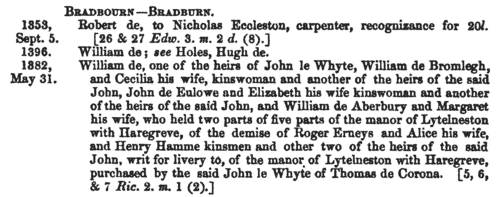
| Inhabitants of London
(1275-1312)
Letter Book B of the City of London contains enrolments of recognizances between inhabitants, particularly citizens, for sums of money lent or due; grants of pieces of land or property; and various records relating to the city administration.
LITTLE. Cost: £4.00.  | Sample scan, click to enlarge
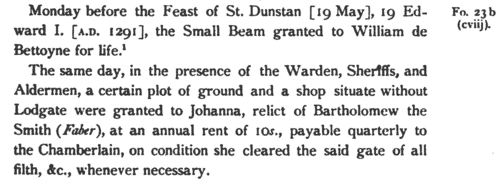
| Clerks and Clergy in Herefordshire, Shropshire and Gloucestershire, Berkshire, Dorset and Wiltshire
(1283-1317)
The register of bishop Richard de Swinfield of Hereford, containing general diocesan business. Hereford diocese covered almost all Herefordshire, southern rural Shropshire, a westward arm of Worcestershire, and a northwestern slice of Gloucestershire. The register also includes ordinations from the diocese of Salisbury (then covering Berkshire, Dorset and Wiltshire) for 1284-1291.LITTLE. Cost: £6.00.  | Sample scan, click to enlarge
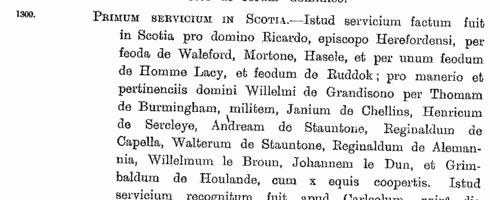
| Grantees of offices, commissions and pardons
(1317-1321)
The Patent Rolls are the Chancery enrolments of royal letters patent. Those for the 11th to the 14th years of the reign of king Edward II (8 July 1317 to 7 July 1321) were edited for the Public Record Office by G. F. Handcock, and published in 1903. The main contents are royal commissions and grants; ratifications of ecclesiastical estates; writs of aid to royal servants and purveyors; and pardons. Most extensive are the commissions of oyer and terminer to justices to investigate complaints about specific crimes and wrongs in particular counties.LITTLE. Cost: £2.00.  | Sample scan, click to enlarge

| Chancery Warrants
(1244-1326)
Warrants were issued by the kings of England to the royal chancery: most of these warrants led to further proceedings which are recorded on the Charter Rolls, Patent Rolls, Fine Rolls, Close Rolls or the Inquisitions: but archivists have identified a large number of warrants for which there are no such equivalent records, and those for the reigns of Edward I and Edward II are gathered here. Most of the entries relate to England and Wales, but with occasional items referring to Ireland and the English possessions in France.LITTLE. Cost: £4.00.  | Sample scan, click to enlarge

| Freemen and citizens of London
(1314-1337)
Letter Book D, or the Liber Rubeus (Red Book) of the City of London contains enrolments of recognizances between inhabitants, particularly citizens, for sums of money lent or due; grants of pieces of land or property; and various records relating to the city administration, minor infractions, &c. In addition, this volume includes the record of admissions to the freedom of the city by redemption (payment of a sum of money), and the binding and discharge of apprenticeships for the same period. Without freedom of the city - which could only be gained by birth (patrimony), apprenticeship or servitude, or by redemption - no man could open a shop, sell goods retail, or even reside within the city walls (except for a limited time, and then only in the houses of freemen and under frankpledge). The text was edited by Reginald R. Sharpe and printed by order of the Corporation of the City of London in 1902.
LITTLE. Cost: £4.00.  | Sample scan, click to enlarge

| Clerks and Clergy in Herefordshire, Shropshire and Gloucestershire
(1327-1344)
The register of bishop Thomas de Charleton of Hereford, containing general diocesan business, but also including ordination lists for monks and clergy. Only a small proportion of the clerks went on to acquire benefices and remained celibate. Hereford diocese covered almost all Herefordshire, southern rural Shropshire, a westward arm of Worcestershire, and a northwestern slice of Gloucestershire.LITTLE. Cost: £6.00.  | Sample scan, click to enlarge

| Clergy at Beverley Minster
(1322-1347)
The minster (collegiate church) of St John of Beverley in Yorkshire was an important foundation with extensive ecclesiastical and temporal rights exercised by the chapter. The main register of the administration in both respects was the chapter act book, and this edition of the act book from 2 February 1322 to 19 November 1347 was edited by Arthur Francis Leach for the Surtees Society and published in 1903. The act book material occupies pages 1 to 136; to this were added extracts relating to Beverley from the registers of the Archbishops of York from 1279 to 1381; miscellaneous documents from York Minster manuscripts and the British Museum from 1135 to 1314; and a copy of the Beverley Provost's Book, compiled in 1417, but with material from the preceding centuries. All these sources are covered by this index: but the bulk of the personal references are from the chapter act book, and relate to clergy at or connected with Beverley.LITTLE. Cost: £4.00.  | Sample scan, click to enlarge
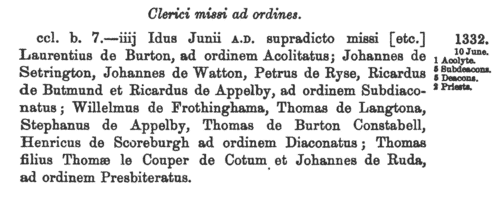
| Inhabitants of Cheshire and North Wales
(1340-1349)
The county of Cheshire had palatine status, being in some measure independent of the rest of England: moreover, from the Statute of Wales of 1284, after king Edward I's subjugation of North Wales, until the union of England and Wales in 1536 to 1543, much of the administration of North Wales (county Flint in particular) was directed from Chester. When the Chester Recognizance Rolls were moved from Chester to the Public Record Office, they were placed among the Welsh Records. These rolls, so called because they do include recognizances (of debts &c.) among their contents, are in fact the Chancery Rolls of the palatinate, containing enrolments of charters, letters patent, commissions and other documents issued under the seal of the palatinate. Deeds and other evidences of a private nature were also enrolled on them. A calendar of the Recognizance Rolls from their commencement to the end of the reign of Henry IV was prepared by Peter Turner and included in the 36th Annual Report of the Deputy Keeper of the Public Records in 1875. We have now indexed this, dividing the enrolments into decades. This is the period from the 13th to the 23rd years of king Edward III.LITTLE. Cost: £6.00.  | Sample scan, click to enlarge
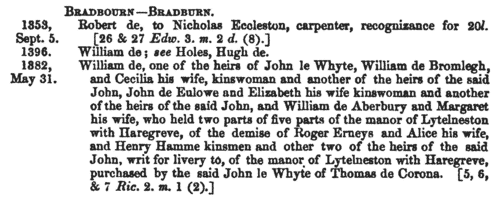
|
Research your ancestry, family history, genealogy and one-name study by direct access to original records and archives indexed by surname.
|












